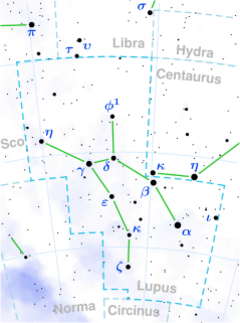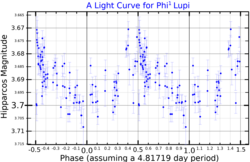Astronomy:Phi1 Lupi
| Observation data Equinox J2000.0]] (ICRS) | |
|---|---|
| Constellation | Lupus |
| Right ascension | 15h 21m 48.36967s[1] |
| Declination | −36° 15′ 40.9525″[1] |
| Apparent magnitude (V) | 3.58[2] |
| Characteristics | |
| Spectral type | K5 III[3] |
| U−B color index | +1.85[2] |
| B−V color index | +1.534±0.005[4] |
| Astrometry | |
| Radial velocity (Rv) | −29.4±0.7[5] km/s |
| Proper motion (μ) | RA: −92.33[1] mas/yr Dec.: −85.67[1] mas/yr |
| Parallax (π) | 11.86 ± 0.16[1] mas |
| Distance | 275 ± 4 ly (84 ± 1 pc) |
| Absolute magnitude (MV) | −1.55[6] |
| Details | |
| Radius | 40[7] R☉ |
| Luminosity | 711.28[4] L☉ |
| Temperature | 3,894±59[8] K |
| Other designations | |
| Database references | |
| SIMBAD | data |
Phi1 Lupi is a solitary[11] star in the southern constellation of Lupus. It is visible to the naked eye with an apparent visual magnitude of 3.58.[2] Based upon an annual parallax shift of 11.86 mas as seen from Earth, it is located around 275 light years from the Sun. The star is drifting closer with a radial velocity of −29 km/s.[5] It has an absolute magnitude of −1.55.[6]
This is an evolved K-type giant star with a stellar classification of K5 III,[3] which means it has used up its core hydrogen and has expanded. At present it has 40 times the radius of the Sun.[7] It is a variable star of unknown type, with an amplitude of 0.008 in visual magnitude and a period of 4.82 days.[12] The star is radiating 711[4] times the luminosity of the Sun from its enlarged photosphere at an effective temperature of 3,894 K.[8]
References
- ↑ 1.0 1.1 1.2 1.3 1.4 van Leeuwen, F. (2007), "Validation of the new Hipparcos reduction", Astronomy and Astrophysics 474 (2): 653–664, doi:10.1051/0004-6361:20078357, Bibcode: 2007A&A...474..653V.
- ↑ 2.0 2.1 2.2 Mermilliod, J.-C. (1986), "Compilation of Eggen's UBV data, transformed to UBV (unpublished)", Catalogue of Eggen's UBV Data (SIMBAD), Bibcode: 1986EgUBV........0M.
- ↑ 3.0 3.1 Houk, Nancy (1979), Michigan catalogue of two-dimensional spectral types for the HD stars, 3, Ann Arbor, Michigan: Dept. of Astronomy, University of Michigan, Bibcode: 1982mcts.book.....H.
- ↑ 4.0 4.1 4.2 Anderson, E.; Francis, Ch. (2012), "XHIP: An extended hipparcos compilation", Astronomy Letters 38 (5): 331, doi:10.1134/S1063773712050015, Bibcode: 2012AstL...38..331A.
- ↑ 5.0 5.1 de Bruijne, J. H. J.; Eilers, A.-C. (October 2012), "Radial velocities for the HIPPARCOS-Gaia Hundred-Thousand-Proper-Motion project", Astronomy & Astrophysics 546: 14, doi:10.1051/0004-6361/201219219, A61, Bibcode: 2012A&A...546A..61D.
- ↑ 6.0 6.1 Ginestet, N. et al. (February 2000), "Magnitudes absolues des étoiles standards MK des types G à M à partir des parallaxes Hipparcos" (in French), Astronomy and Astrophysics Supplement 142: 13–24, doi:10.1051/aas:2000135, Bibcode: 2000A&AS..142...13G.
- ↑ 7.0 7.1 Brown, A. G. A. (August 2018). "Gaia Data Release 2: Summary of the contents and survey properties". Astronomy & Astrophysics 616: A1. doi:10.1051/0004-6361/201833051. Bibcode: 2018A&A...616A...1G. Gaia DR2 record for this source at VizieR.
- ↑ 8.0 8.1 Strassmeier, K. G.; Schordan, P. (2000), "A temperature calibration for MK-class III giants from high-resolution spectral line-depth ratios", Astronomische Nachrichten 321 (5): 277–305, doi:10.1002/1521-3994(200012)321:5/6<277::AID-ASNA277>3.0.CO;2-H, Bibcode: 2000AN....321..277S.
- ↑ "* phi01 Lup". SIMBAD. Centre de données astronomiques de Strasbourg. http://simbad.u-strasbg.fr/simbad/sim-basic?Ident=%2A+phi01+Lup.
- ↑ "/ftp/cats/more/HIP/cdroms/cats". Strasbourg astronomical Data Center. https://cdsarc.cds.unistra.fr/viz-bin/ftp-index?/ftp/cats/more/HIP/cdroms/cats.
- ↑ Eggleton, P. P.; Tokovinin, A. A. (September 2008), "A catalogue of multiplicity among bright stellar systems", Monthly Notices of the Royal Astronomical Society 389 (2): 869–879, doi:10.1111/j.1365-2966.2008.13596.x, Bibcode: 2008MNRAS.389..869E.
- ↑ Koen, Chris; Eyer, Laurent (March 2002), "New periodic variables from the Hipparcos epoch photometry", Monthly Notices of the Royal Astronomical Society 331 (1): 45–59, doi:10.1046/j.1365-8711.2002.05150.x, Bibcode: 2002MNRAS.331...45K.
 |



